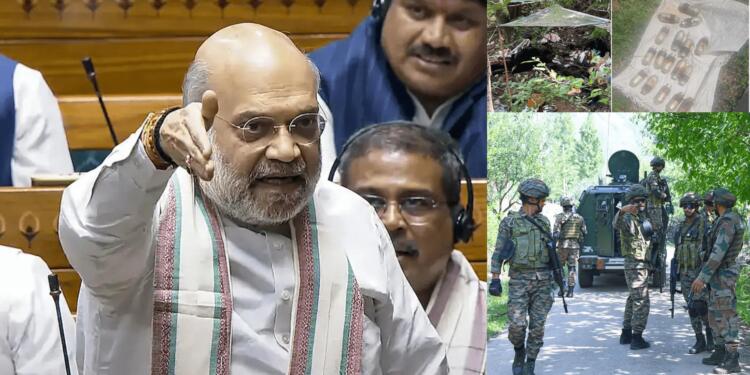In a major success for India’s counter-terrorism efforts, Union Home Minister Amit Shah on Tuesday addressed Parliament to confirm that the three terrorists behind the gruesome April 22 Pahalgam attack, which claimed the lives of 26 civilians, have been neutralised. The decisive strike, carried out under “Operation Mahadev,” was a joint effort by the Indian Army, Central Reserve Police Force (CRPF), and Jammu and Kashmir Police.
Shah declared that forensic evidence, ballistic matching, and the identification of the terrorists by those who had harboured them have confirmed their role in the Pahalgam massacre. He further slammed the Opposition for not standing united in celebrating the success of Indian security forces, raising questions about their political motivations.
Direct Pakistan Link: Chocolates, IDs, and Voter Numbers
The Home Minister went further to underscore Pakistan’s direct involvement in the attack. He revealed that two of the three terrorists carried voter ID numbers from Pakistan and were confirmed to be citizens of the neighbouring country. Additionally, among the materials recovered from the encounter site were food packets and chocolates manufactured in Pakistan.
“Former Home Minister P. Chidambaram asked what proof we have that they came from Pakistan. I want to ask him, what does he gain by shielding Pakistan?” Shah said, in a sharp rebuke to the Opposition. “We have voter numbers, manufactured goods from Pakistan, and now ballistic reports. What more proof is required?”
This evidence lays bare the long-standing pattern of cross-border terrorism supported and facilitated by Pakistan’s establishment. Shah stated that this time, the government was determined to ensure that the attackers wouldn’t cross the border — a promise fulfilled through coordinated action across multiple agencies.
Ballistic Match, Arrests and Identity Confirmation
Amit Shah revealed that the weapons recovered from the terrorists played a key role in establishing their involvement in the Pahalgam killings. Forensic ballistic analysis was conducted after the attack, during which spent cartridge shells were preserved and examined.
After the terrorists were killed, three rifles — an American M9 and two AK-47s — were recovered. These firearms were flown to Chandigarh’s Central Forensic Science Laboratory (FSL) via a special flight. Test-firings were conducted, and shell casings from these rifles were matched with those found at the Pahalgam attack site. The conclusion was unmistakable — these were the exact weapons used to murder 26 innocent civilians.
Shah told the House, “I am holding the ballistic report. It has been cross-verified by six scientists and conclusively confirms a 100% match. There is no doubt — these are the same guns used in the attack.”
In addition, the National Investigation Agency (NIA) had earlier arrested two individuals, Bashir and Parvez, who were accused of sheltering the terrorists. When the bodies of the slain terrorists were brought to Srinagar, the arrested men were brought in for identification. They immediately confirmed the identities of all three terrorists as Suleman alias Faizal, Jibran, and Hamza Afghani — all senior operatives of the Lashkar-e-Taiba terror outfit.
Operation Mahadev: How the Hunt Began
The origins of Operation Mahadev date back to the night of April 22, 2025, when a brutal terrorist attack was carried out in the Baisaran Valley of Pahalgam, Jammu and Kashmir. The victims were primarily local civilians and tourists. In response, a high-level security meeting was convened in Srinagar the same night, chaired by Amit Shah himself.
On May 22, specific human intelligence was received by the Intelligence Bureau (IB), pointing to the presence of the attackers in the Dachigam forest range near Srinagar. This information triggered an intense manhunt. Shah informed Parliament that all agencies decided then and there that the terrorists must not be allowed to flee across the Line of Control into Pakistan.
From May 22 to July 22, multiple patrols, surveillance operations, and intelligence activities were carried out under extreme conditions. Security forces monitored the suspected movement of the terrorists in the difficult Dachigam terrain using advanced sensors and electronic equipment. On July 22, confirmed input was received, and Operation Mahadev was formally launched. In a swift and well-coordinated mission, the three terrorists were cornered and eliminated.
Shah praised the Indian Army, CRPF, Jammu and Kashmir Police, and intelligence agencies for their relentless pursuit of the attackers over two months, often under harsh climatic conditions and high-altitude terrain.
“This was not just a counter-terror operation — this was justice,” he said. “These three terrorists were not nameless gunmen. They were Lashkar commanders, trained, armed, and dispatched by Pakistan. And they are now dead.”
He further noted that after Operation Sindoor, which eliminated key masterminds of cross-border terrorism, Operation Mahadev closed the loop by wiping out the perpetrators of the Pahalgam bloodbath.
Terror Will Be Crushed, With or Without Political Consensus
Operation Mahadev is not just a security success story — it’s a reflection of India’s strategic resolve. What began as a night of terror for 26 families has ended with accountability delivered, justice served, and truth exposed.
Yet, even as Shah laid out irrefutable proof in Parliament, segments of the Opposition remained unmoved, refusing to acknowledge the victory. Shah expressed disappointment: “When our forces eliminate terrorists, should we not set politics aside and stand with them? Instead, some prefer silence, even discomfort. Their faces are blackened by their own duplicity.”
Operation Mahadev has sent a clear signal: Terrorists will not escape, and political posturing will not shield them. India will strike, pursue, and eliminate those who dare attack its people wherever they hide.

























